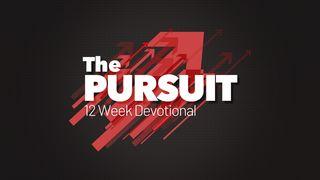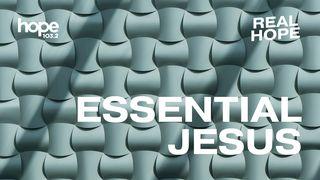Last Words: A Lenten Meditation on the Final Sayings of Christ, Week 5Sample

He Trusted in God that He Would Deliver Him
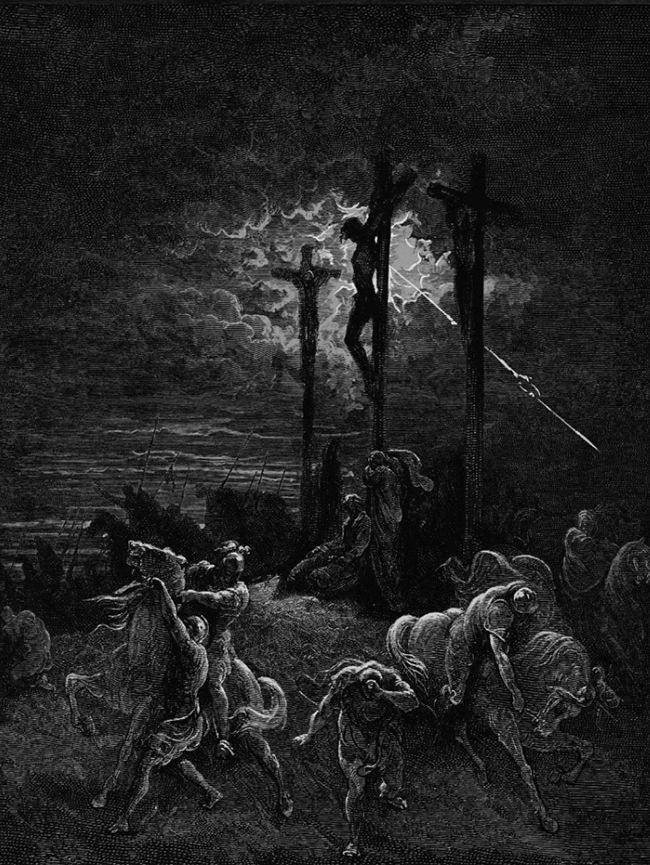
The Darkness at the Crucifixion, Gustave Doré, 1867. Etching on paper. Printed in: Heilige Schrift 1867 by Stuttgarter Druck und Verlagshaus Eduard Hallberger.
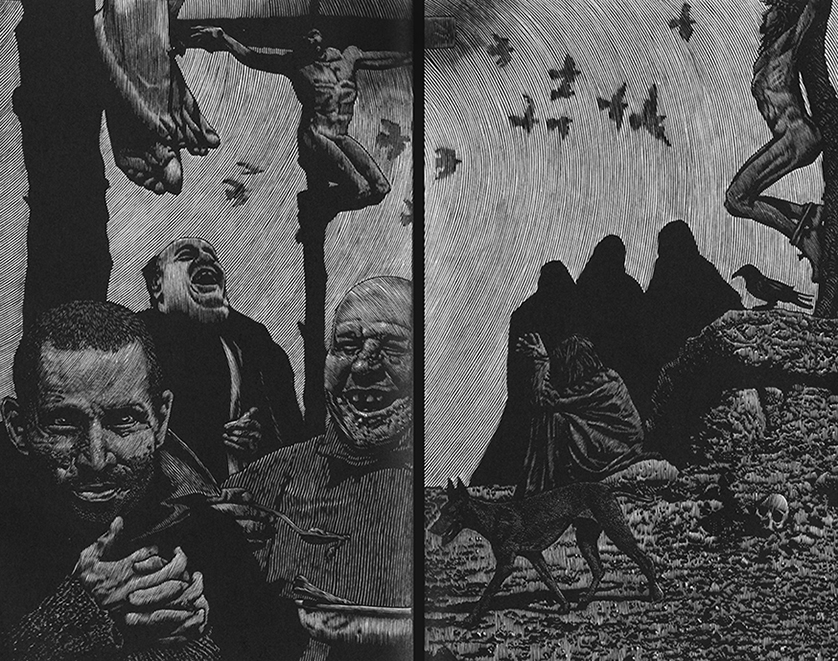
The Crucifixion (diptych), Barry Moser, 1991. 20 x 15 in. Wood engraving on paper. Print from the Pennyroyal Caxton Edition of the Holy Bible.
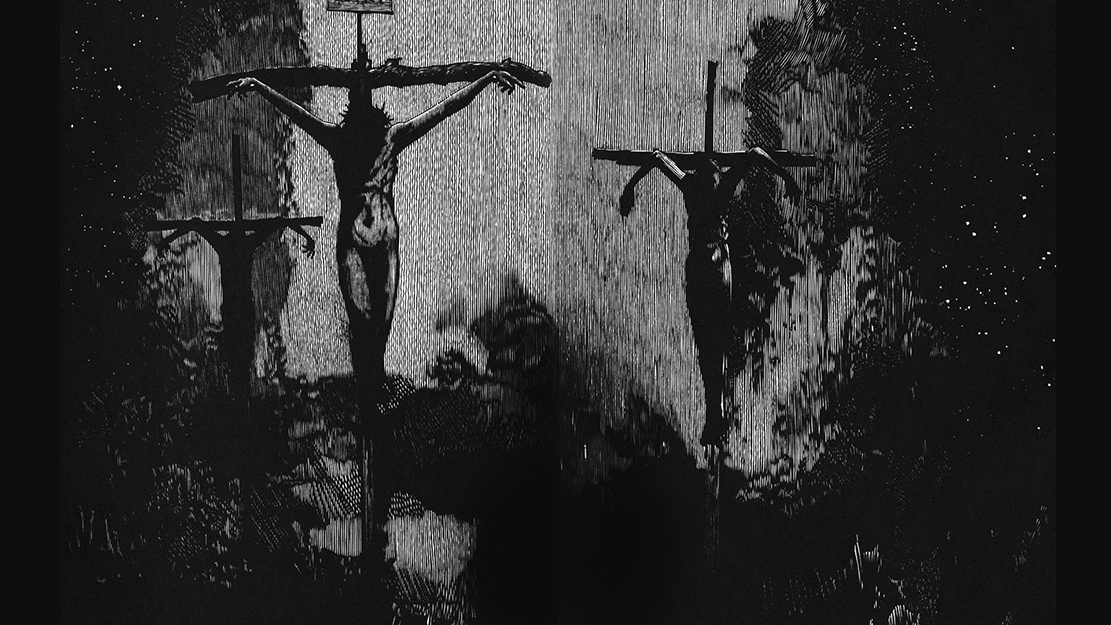
The Crucifixion of Christ, Barry Moser, 1991. 20 x 15 in. Wood engraving on paper. Print from the Pennyroyal Caxton Edition of the Holy Bible.
“Psalm 22” by Poor Bishop Hooper (Jesse and Leah Hooper).
Poetry:
“A Confession to a Friend in Trouble”
by Thomas Hardy
Your troubles shrink not, though I feel them less
Here, far away, than when I tarried near;
I even smile old smiles—with listlessness—
Yet smiles they are, not ghastly mockeries mere.
A thought too strange to house within my brain
Haunting its outer precincts I discern:
—That I will not show zeal again to learn
Your griefs, and, sharing them, renew my pain. . . .
It goes, like murky bird or buccaneer
That shapes its lawless figure on the main,
And each new impulse tends to make outflee
The unseemly instinct that had lodgment here;
Yet, comrade old, can bitterer knowledge be
Than that, though banned, such instinct was in me!
HE TRUSTED IN GOD THAT HE WOULD DELIVER HIM
Psalm 22 is such a dense psalm, thick and rich in meaning, and Mark 15 tells us clearly what it is all about, yet it has been hard for me to study these Scriptures. As I sink into them, the agony expressed here makes me want to turn away and do something else. Honestly folks, as I have meditated on this passage, preparing to write this devotional, I have been overwhelmed. I can hardly bear to read Psalm 22. This instinctual reaction, natural and human, is expressed in today’s poem: we don’t want to share others’ griefs, because sharing their pain renews our own!
But Jesus went into the pain of the cross on purpose—to redeem us from our sins. He did not turn away. He chose to share the pain of humans. He chose to suffer death. He did it on purpose.
And there’s the crux of it: He did this for me, for you, and because the Father told Him to do it. How could the Lord Jesus bear to do this for us? (And we know He did it willingly. He could have called legions of angels to rescue Him, remember!)
Jesus did this to save us.
And for this pain-filled sacrifice that bought our salvation, we adore Him.
Jesus went to the cross in relationship with His Father: “Abba [Daddy], not my will but Yours be done” (Mark 14:36).
So then, consider Jesus, doing this most difficult, excruciatingly hard thing in order to please His Father, trusting in His Father’s leading, obeying God His Father…only to experience His Father’s abandonment in the depths of agony and death.
Psalm 22 expresses this.
Here we see Jesus (fully God, fully man) experiencing His full humanness, drinking that cup of death that we must also drink.
And His death changed our death forever.
Because of Jesus’ agony, we brothers and sisters of Jesus have become a new type of human, a new creation, and now death is for us is a transition to the Home of our Father, not a horrifying solitary end.
But while we know the end of the story, our human experience of death is not easy, just as Jesus’ death was not easy. And like our Brother Jesus, we must go through the door of death and trust in the author of our story.
We do indeed have eternity in our hearts…
But here in these bodies? Here we will groan and cry.
And our Father gathers our tears.
He attends to our ways, but we limited humans can’t see Him fully—and like Jesus, we often feel abandoned at the times when we are being obedient and when we need Him most.
Here’s the mercy in this, my friends—He knows! Jesus knows, by experience, what it is like to be us: to be fragile and heading into a future we would rather not experience (“let this cup pass from me,” He said). Here we see Jesus tortured at the whim of evil men and mocked. And He did the holy thing that we too can do in this position—He cried out to His Father.
And He was heard.
Our part of Psalm 22 today is only the first half of the psalm that Jesus was praying while He hung on the cross. And (spoiler alert, as our music today informs us) later in Psalm 22, it says that Jesus was heard when He cried to the Father (v. 24), and that all the ends of the earth will turn to the Lord and worship the King and serve Him because “He has done it!”
The psalms teach us how to pray. And so, from today’s psalm, we learn that we can ask God “why” in the suffering of our life! And we learn that God the Father is with us even we can’t see Him in the dark times.
We learn how to pray while suffering: we learn how to use the psalms to give words to our prayers of agony and petition.
God is here with you in the pain and darkness. You are not abandoned. He hears you and He is saving you.
You are not alone. This is not the end of your story. Our Brother Jesus has gone ahead of us here and He will bring us Home. He has done it, it is finished.
Prayer:
Heavenly Father, give us the faith to trust you in the dark, and the grace to persevere without sinning. Be near us and hurry to rescue us. We are waiting for You. Come quickly and help us! We ask in the name of our Lord Jesus, who loves us and gave His life for us.
Amen.
Dr. Betsy A. Barber
Faculty Emerita, Institute for Spiritual Formation
Talbot School of Theology
Supervisor, Biola Counseling Center
About this Plan

The Lent Project is an initiative of Biola University's Center for Christianity, Culture and the Arts. Each daily devotion includes a portion of Scripture, a devotional, a prayer, a work of visual art or a video, a piece of music, and a poem plus brief commentaries on the artworks and artists. The Seven Last Words of Christ refers to the seven short phrases uttered by Jesus on the cross, as gathered from the four Christian gospels. This devotional project connects word, image, voice and song into daily meditations on these words.
More
We would like to thank Biola University for providing this plan. For more information, please visit: https://ccca.biola.edu/lent/2025



